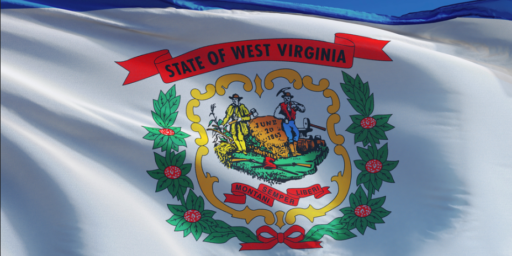Third-Party Candidate Could Pose Problems For GOP Hopes Of Flipping West Virginia
Don Blankenship, who came in third in the Republican Primary in West Virginia earlier this year, is moving forward with plans to run as a third-party candidate in the General Election.

Don Blankenship, the controversial former coal magnate who lost the Republican primary to take on Joe Manchin several months ago, says he’s going to try to get on the November ballot as a third-party candidate notwithstanding West Virginia’s “sore loser” law:
Don Blankenship, the former coal baron who spent time in federal prison and finished third in the West Virginia Republican primary in May, is wading back into the state’s U.S. Senate race, this time attempting to file paperwork to run as a member of the Constitution Party.
Blakenship was convicted in 2015 for conspiracy to violate mine safety and health standards in the aftermath of the 2010 Upper Big Branch Mine disaster that resulted in the death of 29 miners.
In a statement posted on Facebook, Blankenship conceded that he does not expect the filing to be certified due to West Virginia’s “sore loser” law that prohibits candidates that lost in a primary to run in the general election, but that he believes his name will be on the ballot in November.
“The political establishment cannot retroactively enact laws that prohibit individuals who become members of some political parties from being on the ballot while allowing individuals who become members of other political parties to be on the ballot,” Mr. Blakenship wrote Monday.
“This is what the Communist or Nazi party would do and is a perfect example of political party behavior that violates an American’s guaranteed right to equal opportunity. It is a clearly discriminatory law and exactly what George Washington warned of in his farewell address,” he continued.
Here’s Blankenship’s statement:
Blakenship ended up coming in third-place behind Attorney General Patrick Morrisey and Congressman Evan Jenkins in the primary. Nonetheless, prior to the primary, he had become the focus of a rather intense effort to block his campaign in the face of what appeared to have been a rise in the poll. Prior to running for Senate, Blakenship was best known as the CEO of Massey Energy, the owners of the Upper Big Branch Mine, the site of a 2010 mining disaster that led to the death of 29 out of 31 miners who were on site at the time of a devasting explosion. That explosion was later found to be due to massive violations of mine safety laws on the part of Massey, and the disaster led to Blankenship being charged with multiple crimes and convicted on one charge that resulted in him serving a year in Federal prison, a sentence he finished serving less than a year ago. (Source) Needless to say, this is something that national Republicans saw as problematic in a potential nominee in a state that is still heavily dependent on mining as a source of income and employment.
During the campaign, Blankenship made a name for himself thanks largely to a brazen Senate Majority Leader Mitch McConnell and his family that was based primarily on the fact that McConnell is married to Secretary of Transportation Elaine Chao, who happens to be Chinese-American. In the closing weeks of the campaign, Blankenship released a video that was intended to run as a campaign ad during the final weekend of the campaign in which he makes reference to McConnell’s “China person” family, an apparent reference to Chao and her father both of whom are American citizens. Additionally, during interviews leading up to the release of the video, Blankenship referred to Chao’s father, who was born in China and is Chairman of the Board of an international shipping company as a “wealthy China-person.” He also implied that because of this alleged connection to China, McConnell and Chao could not be trusted to put American interests first. He also made some rather bizarre references to McConnell as “Cocaine Mitch,” apparently claiming that he is a drug kingpin or something. In any case, Republican voters rejected him rather overwhelmingly, but apparently, that’s not enough for Blankenship. Even during the primary campaign, though, Blankenship refused to rule out running as an independent in the General Election and within weeks after the campaign, he had announced that he would seek the nomination of the Constitution Party. For obvious reasons, Blakenship’s presence on the ballot could be a problem for Republicans seeking to unseat Manchin in the fall since it could draw at least some portion of the anti-Manchin vote away from Republican nominee Patrick Morrisey, the state Attorney General.
Before he can get on the ballot, though, Blankenship will likely have to spend some time in Court. West Virginia is one of the many states that has a “sore loser” law that bars candidates who have lost a party primary from running in the General Election. Blankenship has already stated, though, that he intends to challenge that law if he’s not permitted to appear on the ballot because of it and, as the Charleston Mail-Gazette reported two months ago, he may have a case due to the way the statute is worded:
Michael Kang teaches elections law at Emory University and has authored academic work on “sour grapes” laws around the country. He said a potential wording error in the law could leave the door open for Blankenship’s run.
“Blankenship probably has an uphill fight to run as an independent after losing the primary, but the law is fuzzy enough that he has an argument against the [Secretary of State’s] position,” he said.
Specifically, Kang noted the law cited by the Secretary of State prohibits independent runs after a primary loss from “candidates who are not already candidates in the primary election for public office.”
He said because Blankenship was — not is — a candidate for the primary election for public office, he may have room to argue. However, he said it is unlikely the Secretary of State would interpret the code as such, potentially triggering a legal challenge. He also said it would be hard to tease out the legislative intent from a wording error.
“It’s a decent argument without knowing more, and if I were determined to run and had the resources to litigate, I would think it’s worth trying out,” Kang said.
Mike Queen, communications director for Secretary of State Mac Warner, said there is no specific language currently in West Virginia code that spells out a sour grapes law. However, he said his office would look to the “intent” of the lawmakers.
“The Secretary’s position is that Mr. Blankenship is not permitted to run again in the general election for the United States Senate,” he said. “If Mr. Blankenship pursues the matter, he will most likely have to bring a legal action to force the Secretary to approve his candidacy and to place his name on the general election ballot. At that time, the court would have to rely on legislative intent, among other legal issues and perhaps previous decisions, to determine if Mr. Blankenship is entitled to run again.”
Robert Bastress teaches constitutional law at West Virginia University. He, too, noted the past-tense/present-tense issue in how the law was phrased. He said he looked into the matter when the Legislature last amended the code and found no effective sour grapes clause.
“I know when the Legislature last amended [the law], it thought it had precluded sore losers, but when I researched the issue after that amendment, I concluded that it was not totally clear that it had done so,” he said. “There is nothing in the Code, to my knowledge, that is as clear as what the [Secretary of State] says.”
He said it seems as if it could be argued either way.
The Legislature passed a bill this year amending the code section handling independent runs to more clearly delineate a sour grapes law.
“For the purposes of this section, any person who was a candidate for nomination by a recognized political party as defined in §3-1-8 of this code may not, after failing to win the nomination of his or her political party, become a candidate for the same political office by virtue of the nomination-certificate process as set forth in this section,” reads House Bill 4434.
But that bill is not effective until 90 days from its March 7 passage.
An independent run in West Virginia requires some legwork. It requires the candidate to round up signatures in the amount of at least 1 percent of the votes cast in the last general election for the same seat, which would be the 2014 Senate race for Blankenship. That petition would need to be filed by Aug. 1.
However, a different code section could trip up Blankenship, which states a candidate cannot have been registered with any other political party within 60 days of filing the announcement.
Whether Blankenship gets on the ballot or not, the current polling shows that Manchin may not have much to worry about no matter who might be on the ballot. As RealClearPolitics shows Manchin currently running an average lead of seven points and the most recent poll, taken by the Republican-leaning Trafalger Group, showed Mancin with a ten point lead over Morrisey in a head-to-head race. In the limited number of polls in which Blankenship has been included, the primary effect of his presence in the mix has been to take votes away from Morrisey, however, which suggests that he could put the seat out of reach for the GOP if he manages to get on the ballot.


Yeah, those predictions about a civil war within the GOP were greatly exaggerated.
I would argue that McConnell can in fact “not be trusted to put American interests first.” But it has nothing to do with his father-in-law’s ethnicity.
Speaking of “China people,” Blankenship’s fiancee, Farrah Meiling Hobbs, is one of them: A Chinese basketball player and model who came to the U.S. in 1996.
Blankenship is far from being the biggest problem for Republicans in this race.